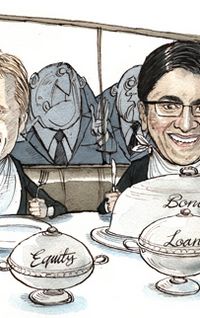Much of Asia’s fortune rides on the continued growth of its two biggest economies. Yet, a look at India and China shows the two facing uncertain futures. While China has shown it can react quickly to a global slowdown, India’s ability to do so is far harder to predict.

India is in the middle of, what is shaping up to be, a severe economic crisis. The rupee hit hitting an all-time low of more than 52 to the US dollar last month. The Sensex has lost more than a third of its value in dollar terms this year and now has the dubious distinction of being Asia’s worst-performing stock exchange. Profit margins among Sensex companies are at seven-year lows and foreign institutional investors are bailing, taking Indian risk off the table, and looking to invest their funds elsewhere.
India ranks 132nd overall out of 183 countries as a desirable place to do business, just above Nigeria and just below the West Bank and Gaza.
A slowing economy, soaring inflation, policy paralysis on the part of the Indian Government, and growing pessimism about the future holds have converged to create a downward spiral. The government is unlikely to have the ability to pass much-needed reforms and policies that will spur economic growth and send the right message to foreign investors. Even if the government succeeds in passing the required legislation, it does not actually have the ability to implement change swiftly enough to reverse India’s rapid descent. Judging from prior experience, the Indian Government does not have a good record at “swiftly” changing much of anything.
At the heart of the issue is India’s democratic system, which gives its 1.2 billion people and 212 tribal groups a say in how the country should be run. One has to ask, in a country this diverse, can democracy be an effective way to manage the country? Consider India’s position in the World Bank Group’s Doing Business 2012 rankings. India ranks 132nd overall out of 183 countries as a desirable place to do business, just above Nigeria and just below the West Bank and Gaza. In several individual rankings, India is near the bottom. For example, for starting a business, India ranks 166th, for obtaining construction permits, it stands at 181st and, with respect to enforcing contracts, it is 182nd. In fact, India ranks above 100 in six of the 10 categories, with the lowest cumulative score of any of the BRIC countries. Not a very inspiring performance for such a large country blessed with so many people and resources.
India’s political system has descended into a combination of political gridlock, xenophobia, entrenched interest, unbridled corruption and self interest. Missing from India’s political class is the courage to break with tradition, embrace change, reject narcissism, and transform its legendary sclerotic bureaucracy into a force for positive change, rather than a perpetual drag on resources. The Indian people must demand this of their leaders, since they appear incapable of asking it of themselves. In the absence of such courage on the part of everyone concerned, India will never be able to realise its destiny as a regional and global power. More to the point – in the absence of doing so, India risks slipping further into an economic abyss, which threatens to derail much of the economic progress that has been made over the past decade.
Money managers continue to short China, but the country has proven -
time and again - that its next landing will be neither hard nor soft, but, rather, none at all.
Where’s a benevolent dictatorship when you need one?
Contrast India’s performance with that of China. It is blessed with a one-party state obsessed about maintaining stability and forward momentum, and has consistently delivered the goods – in good times and bad. Every time recession knocks on China’s door, prognosticators speculate about whether its next economic ‘landing’ will be hard or soft. Money managers continue to short China, but the country has proven – time and again – that its next landing will be neither hard nor soft, but, rather, none at all. Western economists still make the mistake of forgetting that China defies conventional thinking. As market forces have less of an impact than the will of the Chinese Government, the boom will sustain and Beijing will ensure it does.
So, is the Chinese economy built on sustainable fundamentals or on quicksand? There is much evidence that the foundation of China’s fantastic growth is unsustainable, but that has been the case for years, and it continues to grow and grow. Bank lending has been out of control for years, the sales of homes have risen at an astronomical rate, and two-thirds of the country’s GDP comprises fixed-asset investments – unsustainable on any measure. However, these examples mask some hidden strengths, such as the fact that most homes are paid for in cash, urban disposable income has grown an average of 7% per year since 2000, and real output per worker rises between 10% and 12% per year. The checks and balances in place, therefore, enable China’s economy to maintain equilibrium.
China’s banking system, which half a dozen enormous state-owned banks dominate, has almost unlimited access to low-cost credit, enabling it to engage in unbridled real-estate speculation and giving the banks an incentive to keep the seemingly endless cycle of high growth going. Last year, it was reported that there were approximately 65 million empty apartments that Chinese citizens had purchased not to occupy, but to flip at some time in the future. We know how that kind of behaviour ended up in the US and elsewhere. However, as local governments depend on the tax revenue generated from such purchases, they, too, have vested interests in keeping the system in place. Some western economists predict that the housing bubble will need to be punctured before inflation rises to such an extent that it risks causing social disharmony – something the Chinese Government is anxious to avoid.
In praise of the one-party state
China’s political and financial systems should be seen as sources of strength for the country’s economy, however imperfect it may be, because of its ability to support the financing of infrastructure and other investments needed to sustain rapid growth. That state-owned banks able to lend at will at low cost dominate the banking sector certainly has its advantages, and is a prime reason for expectations that China’s economy may continue to grow in the 9%–10% range for the current decade and beyond. Beijing is doing a good job at pumping the brakes or pushing the accelerator pedal when necessary, and it has many more fiscal and monetary options at its disposal than most western governments at the present time.
In short, there is every reason to believe that a combination of government economic controls, a high degree of liquidity, rising incomes and consumer spending should mean there will be no landing in China. The shorts are likely to end up on the wrong side of that long-term coin. In contrast, the shorts are likely to prevail in India, where the government has proven to be its own worst enemy. In that regard, it shares something with the US Government, which also cannot get its act together or agree on much of anything at a time of dire need. When the chips are down, a one-party state at least has a chance to get the job done. We are stuck too much on labels – just give me a government that gets the job done.
* Daniel Wagner is CEO of Country Risk Solutions, a cross-border risk management consulting firm, based in Connecticut (US), and author of the forthcoming book, Managing Country Risk (March 2012).



